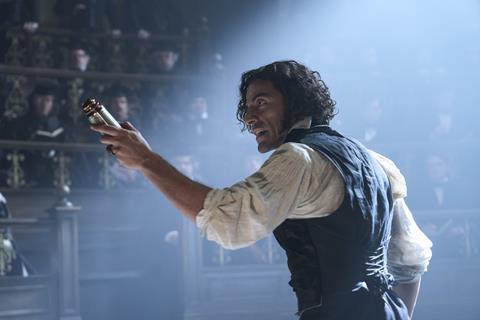Mia Goth, Christoph Waltz and Charles Dance also star in del Toro’s epic take on Mary Shelley’s Gothic novel

Dir/scr: Guillermo del Toro. US. 2025. 149mins
Guillermo del Toro’s Frankenstein is a tale of madness and pain that works best at its most operatic. Oscar Isaac and Jacob Elordi are superb as, respectively, the ethically hideous Victor Frankenstein and the beautifully innocent creature he brings to life, both of them doomed. Del Toro has long been a fan of Mary Shelley’s influential 1818 novel, and has often made films about misunderstood misfits, which explains why this handsome adaptation echoes so many of the themes coursing through his oeuvre. But if the writer/director doesn’t significantly reimagine the source material, he certainly invests it with emotion and passion — especially when exploring humanity’s fundamental darkness.
A lavish Gothic melodrama
Premiering in Venice, which last hosted del Toro’s Oscar-winning The Shape Of Water, Frankenstein opens in US and UK theatres on October 17, then begins streaming on Netflix on November 7. It has been 31 years since the last major Hollywood adaptation of Shelley’s acclaimed work, Kenneth Branagh’s poorly-reviewed Mary Shelley’s Frankenstein, (2016’s Victor Frankenstein was inspired by the book), and del Toro’s involvement should attract both genre fans and awards-season voters. This prestige picture boasts impressive technical credits, bolstered by a starry ensemble that also includes Mia Goth.
Set during the second half of the 19th century, the film introduces us to a dying, bloodied Victor Frankenstein (Isaac), who is inexplicably found near the North Pole by a group of explorers. Immediately, they are attacked by a fearsome creature (Elordi) demanding they hand Victor over to him. The creature is briefly dispatched, allowing Victor the opportunity to tell his story through flashbacks — specifically, how he vowed to defeat death by animating a dead body stitched together from disparate corpses. First Frankenstein lets Victor recount his cautionary tale, then the narrative switches so that the creature can relate the events from his perspective.
Not surprisingly, del Toro’s adaptation shows immense compassion for the creature, who is belittled and mistreated by Victor. Isaac plays this scientist with boundless arrogance and callousness, emphasising the character’s unbridled ambition. An early flashback suggests that young Victor was profoundly affected by his beloved mother’s death — he blamed his distant father (Charles Dance), a noted surgeon, for not doing all he could to save her — but it is clearly ego rather than grief that drives Victor. Whether berating his creation for his seeming lack of intelligence or scheming to possess his younger brother’s enigmatic fiancee Elizabeth (Goth), Victor is a twisted, evil malcontent, and Isaac gives a knowingly flamboyant performance.
By contrast, Elordi’s creature is a gentle spirit, despite his incredible strength and ferocious temper when angered. In recent films such as Priscilla, in which he played Elvis Presley, Elordi has been an ethereal, dreamy presence, and similarly here he conveys a fractured soul trying to understand how he came to be while navigating a savage outside world that considers him a threat. The creature’s initial sweetness gives way to rage once his life is threatened, and there’s poetry to Elordi’s melancholy, volatile turn — Victor’s creation learns that he cannot be killed, which ironically robs him of the ability to be truly alive.
Several of del Toro’s regular creative team, including Nightmare Alley production designer Tamara Deverell, return to ensure that Frankenstein is a lavish Gothic melodrama full of crumbling castles and ornately crafted interiors. The prosthetic makeup overseen by Mike Hill transforms Elordi into this inhuman being whose vivid eyes highlight the vibrant essence within. And composer Alexandre Desplat drapes the proceedings in a soaring orchestral score that heightens the story’s horror and tragedy, proving particularly affecting in the film’s later stretches as Victor and the creature, despite being locked in a life-or-death battle, begin to grasp their shared, cursed destiny.
When Frankenstein attempts emotional delicacy, del Toro’s occasionally awkward, on-the-nose screenplay undercuts the quieter moments. The unrequited longing Victor feels for Elizabeth fails to resonate, just as her growing affection for the creature comes across as forced. As is often the case with del Toro’s pictures, Frankenstein is frequently a triumph of spectacle over nuance — grand gestures over precise character insights. Still, by envisioning this confrontation between its paired protagonists as an epic metaphor for humanity’s hubris at trying to play God, the filmmaker knows who the novel’s true monster is.
Production companies: Double Dare You, Demilo Films, Bluegrass 7
Worldwide distribution: Netflix
Producers: Guillermo del Toro, J. Miles Dale, Scott Stuber
Screenplay: Guillermo del Toro, based on the novel Frankenstein; Or, The Modern Prometheus by Mary Shelley
Cinematography: Dan Laustsen
Production design: Tamara Deverell
Editing: Evan Schiff
Music: Alexandre Desplat
Main cast: Oscar Isaac, Jacob Elordi, Mia Goth, Felix Kammerer, David Bradley, Lars Mikkelsen, Christian Convery, Charles Dance, Christoph Waltz























